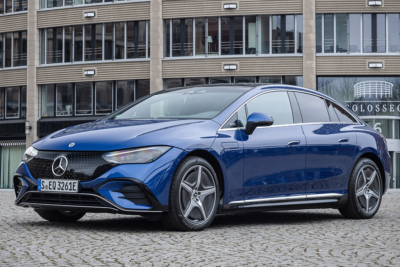
Between the beginning of July and the end of September, Mercedes-Benz Cars sold 42,500 electric cars, which is 31% less than in Q3/2023 and also 7% below the result (45,800 BEVs). At Mercedes-Benz Group level (i.e.
the passenger car business and the van division), 46,900 electric vehicles were sold in Q3, also 31 per cent below the same period last year and eight per cent below Q2/2024. By comparison, , saw electric deliveries increase by 10.1 per cent to 103,440 units in the same period – it was the second quarter in a row with six-digit EV sales for the Munich-based company.
In the current year, the BMW Group has already sold 294,054 BEVs. The Mercedes statistics show 148,500 electric vehicles at Group level (-22 per cent). Even if plug-in hybrids are included, Mercedes’ sales of 267,400 vehicles do not come close to BMW’s pure BEV sales.
So, while BMW is establishing itself in the six-digit range, its German competitor is currently not even managing to reach the 50,000 mark per quarter – something it achieved in all quarters of 2023. At Mercedes, the sales trend is different from that of BMW: while plug-in hybrids in Munich were around 20 per cent down compared to the same period last year, PHEV sales at Mercedes rose by 21.4 per cent.
At 44,700 units, plug-in hybrids again account for more than half of ‘xEV’ sales, which is how Mercedes groups BEVs and PHEVs together. In the same period last year, the figure was 36,800 plug-in hybrids. The situation at the Mercedes Group is better across all drive types: with 594,600 vehicles delivered, the Stuttgart-based carmaker is only around three per cent down year-on-year, despite the difficult macroeconomic environment – especially in China.
“An overall lower consumption, especially for luxury goods and continued discounting mainly in the EV segment, affected sales in China,” the manufacturer writes. According to the company, Mercedes benefited from stable sales in Europe and growth of 29 per cent in the US – there, however, mainly thanks to the improved availability of the GLC combustion model and new AMG models. However, at 7.
9 per cent, the BEV rate is still low. Mercedes will have to make an effort to achieve the CO2 fleet targets in 2025 with this sales trend. “The market environment for battery electric vehicle (BEV) sales remained subdued with competitive pricing in important markets,” Mercedes said, indirectly confirming that it still does not want to fully participate in the discount battles – even if it is at the expense of sales.
The van business has also suffered from “various country-specific developments in the core markets.” Sales fell significantly across all drive types and in the electric segment. In Q3, Mercedes-Benz Vans sold 4,400 electric vans, 31 per cent fewer than in the previous year and 16 per cent fewer than in the second quarter.
In the current year, electric vans are 16 per cent down on the previous year with 12,600 deliveries. As stated in the press release, Mercedes-Benz Vans explains the decline “mainly” with the global drop in demand for fully electric vehicles. At five per cent, the company could keep its global share of all-electric vans stable in Q3.
.










